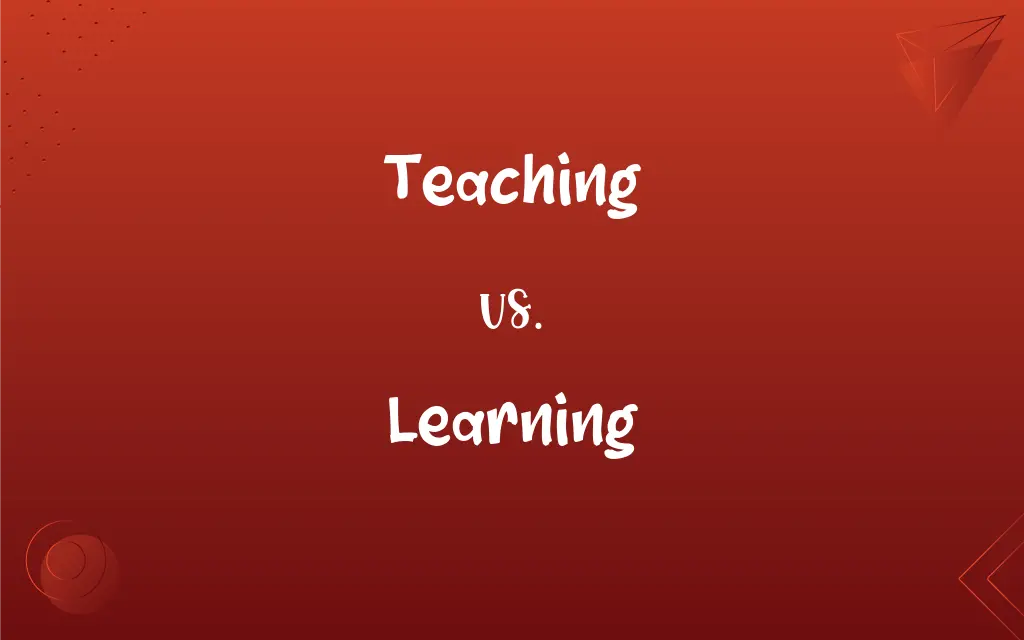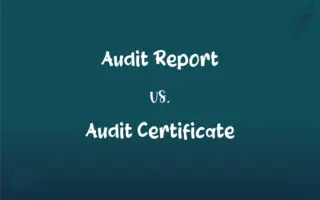Teaching vs. Learning: What's the Difference?
Edited by Aimie Carlson || By Harlon Moss || Updated on November 14, 2023
Teaching is the act of imparting knowledge or skills; learning is the act of acquiring knowledge or skills.

Key Differences
Teaching refers to the deliberate efforts made by someone, often an educator or mentor, to convey knowledge, skills, or understanding to others. Learning, on the other hand, is the personal process by which individuals absorb, assimilate, and apply new information or abilities.
Teaching is typically a proactive endeavor. It involves planning, strategizing, and employing methods to help others understand and grasp concepts. Learning is more of a reactive process, where individuals process and internalize information taught or experienced.
While teaching is often seen as a transfer of knowledge from one individual to another, learning is inherently personal. It requires motivation, engagement, and often self-reflection. Though teaching can facilitate it, learning ultimately depends on the learner's initiative and efforts.
In a classroom, teaching is what the instructor does: presenting material, guiding discussions, and providing feedback. Learning, in contrast, is what the student engages in: listening, questioning, practicing, and internalizing the content.
At its core, teaching aims to create an environment conducive to learning. It's about crafting experiences, offering insights, and sparking curiosity. Learning, conversely, is the internal journey an individual takes to understand, make connections, and apply what's been taught.
ADVERTISEMENT
Comparison Chart
Nature
Proactive
Reactive
Dependency
On the teacher's methods
On the learner's initiative
Objective
To impart knowledge
To acquire knowledge
Process
Delivering content
Absorbing content
Result
Can be measured by teaching methods effectiveness
Measured by understanding and application
ADVERTISEMENT
Teaching and Learning Definitions
Teaching
Teaching is the act of imparting knowledge.
She excelled in teaching mathematics to high school students.
Learning
Learning is a lifelong journey of discovery.
Even in his old age, he never stopped learning.
Teaching
Teaching is shaping the understanding of learners.
Through her interactive teaching, she made complex topics accessible.
Learning
Learning is adapting to new understandings or skills.
By learning a new language, he could communicate with more people.
Teaching
Teaching involves guiding or instructing others.
His passion for teaching shines through in every lecture.
Learning
Learning involves internalizing new information.
Practical experiences often enhance the learning process.
Teaching
Teaching is facilitating the learning process.
Effective teaching requires understanding the needs of diverse learners.
Learning
Learning is the process of acquiring knowledge.
Through constant reading, she continued her learning journey.
Teaching
Teaching is about influencing and inspiring students.
His teaching inspired many to pursue careers in science.
Learning
Learning requires active engagement and curiosity.
Hands-on projects promote deeper learning for students.
Teaching
The act, practice, occupation, or profession of a teacher.
Learning
The act, process, or experience of gaining knowledge or skill.
Teaching
Something taught.
Learning
Knowledge or skill gained through schooling or study.
Learning
(Psychology) Changes in behavior resulting from experience, especially changes due to conditioning.
FAQs
How is learning different from mere memorization?
Learning involves understanding and applying information, while memorization is just retaining facts.
What is the main goal of teaching?
The main goal of teaching is to impart knowledge and facilitate understanding.
Can teaching occur without learning?
Yes, teaching can occur without learning if the student doesn't internalize or understand the content.
How does technology impact teaching and learning?
Technology can enhance teaching methods and provide diverse learning resources, making information more accessible.
Why is feedback crucial in the teaching process?
Feedback helps in guiding learners, addressing misconceptions, and enhancing the learning process.
How can one enhance their learning capabilities?
Through active engagement, practice, seeking feedback, and continuous self-reflection.
Can one be a teacher without formal training?
While formal training equips teachers with methodologies, one can still teach based on expertise and experience.
How is peer learning different from traditional learning?
Peer learning involves students teaching and learning from each other, promoting collaboration and diverse perspectives.
How can teaching methods impact learning outcomes?
Effective teaching methods can enhance understanding, retention, and application of knowledge.
What's the role of a teacher in modern education?
A teacher's role is not just imparting knowledge but also facilitating, mentoring, and guiding students to think critically.
Why is active learning important?
Active learning engages students, promotes deeper understanding, and helps in retaining information.
What are the challenges in remote learning?
Remote learning can pose challenges like limited interaction, technological issues, and self-motivation requirements.
Can learning be self-directed?
Yes, self-directed learning involves individuals taking initiative in their own educational journey.
How can experiential teaching benefit students?
Experiential teaching allows students to apply knowledge, enhancing understanding and retention.
Why is lifelong learning important?
Lifelong learning helps in adapting to changes, personal growth, and staying updated in one's field.
How does mindset influence learning?
A growth mindset can boost resilience, curiosity, and openness to new information and challenges.
Can teaching be a two-way process?
Yes, reciprocal teaching involves both parties teaching and learning from each other.
Is learning always a result of teaching?
No, learning can also result from experiences, observations, and self-study.
How do motivation and interest affect learning?
Motivation and interest enhance engagement, leading to better understanding and retention of information.
How does collaborative teaching impact learning?
Collaborative teaching provides diverse perspectives, promoting richer understanding and critical thinking.
About Author
Written by
Harlon MossHarlon is a seasoned quality moderator and accomplished content writer for Difference Wiki. An alumnus of the prestigious University of California, he earned his degree in Computer Science. Leveraging his academic background, Harlon brings a meticulous and informed perspective to his work, ensuring content accuracy and excellence.
Edited by
Aimie CarlsonAimie Carlson, holding a master's degree in English literature, is a fervent English language enthusiast. She lends her writing talents to Difference Wiki, a prominent website that specializes in comparisons, offering readers insightful analyses that both captivate and inform.

































































